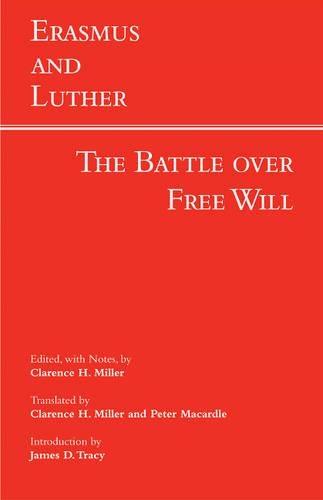
Erasmus and Luther: The Battle over Free Will: The Battle Over Free Will
(Hardback)
Available Formats
Publishing Details
Erasmus and Luther: The Battle over Free Will: The Battle Over Free Will
By (Author) Clarence H. Miller
Translated by Peter Macardle
Introduction by James D. Tracy
Hackett Publishing Co, Inc
Hackett Publishing Co, Inc
1st April 2012
United States
Classifications
General
Non Fiction
Theology
234.9
Physical Properties
Hardback
416
Width 140mm, Height 216mm
539g
Description
This compilation of writings from Erasmus and Luther's great debateover free will and grace, and their respective efficacy for salvationoffers a fuller representation of the disputants' main arguments than has ever been available in a single volume in English. Included are key, corresponding selections from not only Erasmus' conciliatory A Discussion or Discourse concerning Free Will and Luther's forceful and fully argued rebuttal, butwith the battle now joinedfrom Erasmus' own forceful and fully argued rebuttal of Luther. Students of Reformation theology, Christian humanism, and sixteenth-century rhetoric will find here the key to a wider appreciation of one of early modern Christianity's most illuminating and disputed controversies.
Reviews
Among the most dramatic exchanges in Western intellectual history was the confrontation between Erasmus and Luther over freedom of the will--or, as Luther conceived of it, bound choice. Clarence H. Miller provides extensive selections from both sides of this vital debate--from Erasmus' A Discussion or Discourse concerning Free Will ; from Luther's reply, The Enslaved Will ; and from Erasmus' extensive rebuttal, The Shield-Bearer Defending 'A Discussion' --outfitting them with helpful notes that bring readers into the world of the texts. James D. Tracy's Introduction masterfully and concisely depicts the two participants in this literary disputation, the concerns that governed their thinking, and the intellectual context of their debate--one that still offers much to readers reflecting on what it means to be human in our own age. --Robert A. Kolb, Missions Professor of Systematic Theology Emeritus, Concordia Seminary
Erasmus has the first and last word in this version of the famous debate on free will. He needs all the help he can get, given that Luther captivates the readers with his scathing wit, pristine deductive logic, and pithy if dismissive rejoinders. . . . This volume of substantial excerpts translated by Clarence H. Miller and Peter Macardle . . . provides Reformation scholars with the most comprehensive existing treatment of the exchange between Erasmus and Luther on the Reformation exegesis, philosophy, and politics of free will, grace, and Law. The comprehensive and detailed biographical and theological introduction concisely covers the cultural history and the central doctrinal issues informing the debate, most notably the Pauline influences." --Alice Crawford Berghof, English, UC Irvine (adapted from Comitatus )
As James D. Tracy notes in the excellent introduction to Clarence H. Miller's Erasmus and Luther: The Battle over Free Will, 'In the history of the European Reformation, few issues were as important as the one debated by Erasmus and Luther: Are human beings capable of contributing to their own salvation by what they choose to do or not to do' Miller's edition provides a more comprehensive view of the debate than the usual English texts used in classrooms and accurately reflects the history of the debate. Miller and Macardle's translation is clear and flows well. Compared to Winter's text, this edition offers a stronger supportive apparatus, including helpful notes and an updated bibliography. Erasmus' and Luther's debate over the freedom of the will remains a central point of access to the study of the Reformation. It highlights the fundamental issues of the Reformation as well as the differences between those eager for reform within the Church and those who believed that the Church was so fundamentally off track that no reform could sufficiently set it right. Luther's vehemence and self-assurance in The Enslaved Will say almost as much about his reform movement as his arguments do. Erasmus' three efforts to defend the freedom of the will demonstrate not only his nuanced approach to theology, Scripture, and Church tradition, but also his concern for the consequences of Church schism." --Greta Grace Kroeker, History, University of Waterloo (condensed from Erasmus of Rotterdam Society Yearbook )
Author Bio
Clarence H. Miller is Professor Emeritus of English, St. Louis University. Peter Macardle is Lecturer in German in the School of Modern Languages and Cultures, Durham University. James D. Tracy is Professor Emeritus of History, University of Minnesota.
